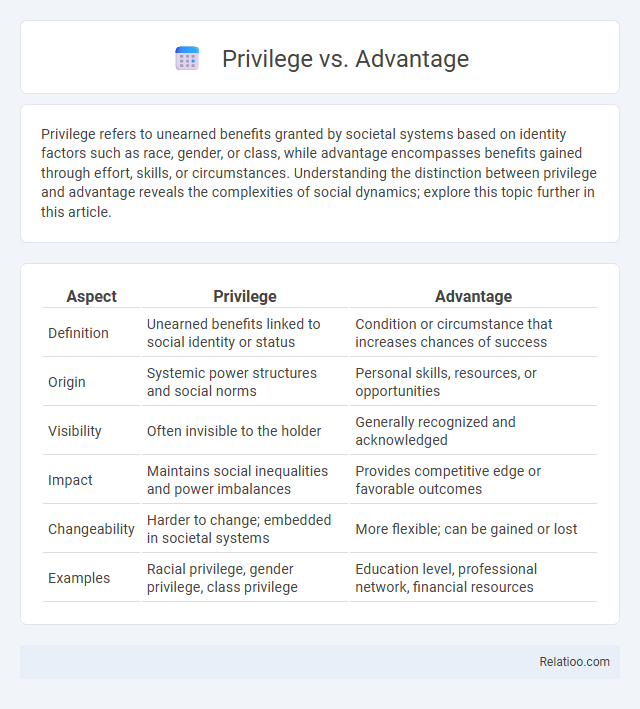Privilege refers to unearned benefits granted by societal systems based on identity factors such as race, gender, or class, while advantage encompasses benefits gained through effort, skills, or circumstances. Understanding the distinction between privilege and advantage reveals the complexities of social dynamics; explore this topic further in this article.
Table of Comparison
| Aspect | Privilege | Advantage |
|---|---|---|
| Definition | Unearned benefits linked to social identity or status | Condition or circumstance that increases chances of success |
| Origin | Systemic power structures and social norms | Personal skills, resources, or opportunities |
| Visibility | Often invisible to the holder | Generally recognized and acknowledged |
| Impact | Maintains social inequalities and power imbalances | Provides competitive edge or favorable outcomes |
| Changeability | Harder to change; embedded in societal systems | More flexible; can be gained or lost |
| Examples | Racial privilege, gender privilege, class privilege | Education level, professional network, financial resources |
Understanding the Concepts: Privilege vs Advantage
Privilege refers to unearned benefits or rights granted to individuals based on societal structures, while advantage denotes favorable circumstances or conditions that enhance one's opportunities. Understanding the concepts of privilege versus advantage helps you recognize systemic inequalities versus personal gains obtained through effort or circumstance. This distinction is crucial in addressing social justice and creating equitable environments.
Historical Roots of Privilege and Advantage
Privilege and advantage both denote benefits or favorable conditions, but privilege often carries historical and systemic weight tied to social hierarchies and power structures, rooted in legal and cultural traditions dating back to feudal societies and colonial systems. Advantage generally refers to any circumstance or factor that improves one's position without necessarily implying inherited or institutionalized status. The historical roots of privilege emphasize entrenched inequalities maintained through legislative acts, social norms, and economic control, whereas advantage can be more situational and individual.
Key Differences Between Privilege and Advantage
Privilege refers to unearned benefits or rights granted to certain groups based on identity factors like race, gender, or social class, while advantage denotes favorable circumstances or opportunities that improve a person's position. Your understanding of privilege involves recognizing systemic inequalities that perpetuate certain groups' inherent benefits, in contrast to advantage, which can result from effort, skill, or situational factors. The key difference lies in privilege being built into societal structures, whereas advantages are more fluid and potentially accessible through personal actions or external conditions.
Social Implications of Privilege
Privilege represents unearned social power granted to certain groups based on characteristics like race, gender, or class, which profoundly shapes systemic inequalities. Unlike an advantage, which can be situational or earned, privilege is embedded in social structures, influencing access to opportunities, resources, and rights without deliberate effort. Understanding your privilege helps identify how societal systems perpetuate disparities and highlights the need for equitable practices that address these deeply rooted imbalances.
Economic Impact of Advantages
Advantages in economics refer to factors like comparative or competitive benefits that improve productivity and market outcomes, driving growth and efficiency. Privileges denote exclusive rights or benefits granted to specific groups, often leading to unequal wealth distribution and affecting economic mobility. The economic impact of advantages usually results in broader market efficiency and innovation, while privileges can create systemic barriers that limit equal opportunity and economic inclusion.
Intersectionality: When Privilege and Advantage Overlap
Intersectionality reveals how privilege and advantage often overlap, creating compounded social inequalities based on race, gender, class, and other identities. Your experiences can be shaped by multiple layers of privilege, such as a wealthy person of color navigating systemic biases differently than someone wealthy and white. Understanding this intersection helps recognize how overlapping privileges amplify access to resources and opportunities, reinforcing societal hierarchies.
Recognizing Unseen Privileges and Advantages
Recognizing unseen privileges involves identifying inherent social benefits often unnoticed due to cultural norms or personal experiences, such as racial or economic privileges that grant unfair advantages in education or employment. Advantages, in contrast, can be more situational and earned, like access to better resources or networking opportunities that improve one's position without systemic entitlement. Understanding the subtle differences between privilege and advantage highlights the importance of addressing structural inequalities that perpetuate invisible barriers for marginalized groups.
Can Advantages Be Earned or Given?
Advantages can be earned through effort, skill, or merit, reflecting personal achievements or competencies. Privileges, however, are typically granted based on social status, identity, or external conditions rather than earned performance. Understanding the distinction clarifies how advantages align with individual agency, while privileges often represent unearned benefits within societal structures.
Challenging Privilege in Modern Society
Challenging privilege in modern society requires understanding the nuanced differences between privilege and advantage, where privilege often denotes unearned benefits linked to identity, such as race or gender, while advantages can be situational or earned. Your awareness of systemic privilege is crucial in addressing social inequalities and fostering inclusivity by recognizing how these disparities shape opportunities and experiences. Focusing on dismantling ingrained privilege demands ongoing reflection and active participation in conversations about equity and justice.
Fostering Equity: Balancing Privilege and Advantage
Fostering equity requires recognizing the distinction between privilege, inherent rights or benefits granted by social structures, and advantage, which refers to the tangible benefits gained from privilege. Balancing privilege and advantage involves creating policies that redistribute opportunities and resources to marginalized groups, ensuring equitable access to education, healthcare, and employment. Effective equity frameworks prioritize dismantling systemic barriers while amplifying the voices of underrepresented communities to achieve social justice.

Infographic: Privilege vs Advantage
 relatioo.com
relatioo.com